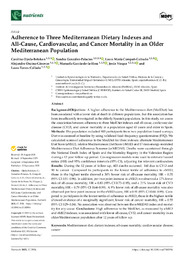Título :
Adherence to Three Mediterranean Dietary Indexes and All-Cause, Cardiovascular, and Cancer Mortality in an Older
Mediterranean Population |
Autor :
Ojeda-Belokon, Carolina
González Palacios, Sandra 
Compañ Gabucio, Laura M 
Oncina Canovas, Alejandro 
Garcia de la Hera, Manuela 
Vioque, Jesús
Torres-Collado, Laura  |
Editor :
MDPI |
Departamento:
Departamentos de la UMH::Patología y Cirugía
Departamentos de la UMH::Salud Pública, Historia de la Ciencia y Ginecología |
Fecha de publicación:
2025-09 |
URI :
https://hdl.handle.net/11000/38595 |
Resumen :
Background/Objectives: A higher adherence to the Mediterranean diet (MedDiet) has
been associated with a lower risk of death in different populations, but this association has
been insufficiently investigated in the elderly Spanish population. In this study, we assess
the association between adherence to three MedDiet indexes and all-cause, cardiovascular
disease (CVD), and cancer mortality in a population aged 65 years and older in Spain.
Methods: The population included 903 participants from two population-based surveys.
Diet was assessed at baseline by using validated food-frequency questionnaires (FFQ). We
calculated scores of adherence to the MedDiet for three indexes: alternate Mediterranean
Diet Score (aMED), relative Mediterranean Diet Score (rMED) and 17-item energy-restricted
Mediterranean Diet Adherence Screener (erMEDAS). Deaths were ascertained through
the National Death Index of Spain and the Mortality Registry in the Valencian Region
during a 12 year follow-up period. Cox regression models were used to estimate hazard
ratios (HR) and 95% confidence intervals (95% CI), adjusting for relevant confounders.
Results: During the 12 years of follow-up, 403 deaths occurred: 160 due to CVD and
90 to cancer. Compared to participants in the lowest tertile of adherence to aMED,
those in the highest tertile showed a 30% lower risk of all-cause mortality, HR = 0.70
(95% CI 0.51–0.96). In addition, per two-point increase in aMED, we observed a 17% lower
risk of all-cause mortality, HR = 0.83 (95% CI 0.73–0.95), and a 21% lower risk of CVD
mortality, HR = 0.79 (95% CI 0.64–0.99). A 9% lower risk of all-cause mortality was also
observed per two-point increase in the rMED score, HR = 0.91 (95% CI 0.84–0.99). Compared
to participants in the lowest tertile of adherence to rMED, those in the highest tertile
showed evidence of a marginally significant, lower risk of cancer mortality, HR = 0.55
(95% CI 0.29–1.04). No association was observed between the erMEDAS index and mortality
for any cause. Conclusions: High adherence to the MedDiet, as measured by aMED
and rMED indexes, was associated with lower all-cause, CVD, and cancer mortality in an
older Mediterranean population after 12 years of follow-up.
|
Palabras clave/Materias:
mediterranean diet
dietary indexes
all-cause mortality
cardiovascular disease
cancer |
Tipo de documento :
info:eu-repo/semantics/article |
Derechos de acceso:
info:eu-repo/semantics/openAccess
Attribution-NonCommercial-NoDerivatives 4.0 Internacional |
DOI :
10.3390/nu17182956 |
Publicado en:
Nutrients . 2025 Sep 13;17(18):2956 |
Aparece en las colecciones:
Artículos Salud Pública, Historia de la Ciencia y Ginecología
|
 La licencia se describe como: Atribución-NonComercial-NoDerivada 4.0 Internacional.
La licencia se describe como: Atribución-NonComercial-NoDerivada 4.0 Internacional.
.png)
